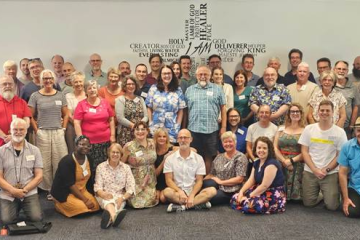Exodus 1:8-22, Romans 12:1-8
Sometimes, writes poet Godfrey Rust,
words are not enough
for everything we have to say.
Words can’t beat like a heart.
A verb won’t sweat or bleed.
A noun doesn’t get thirsty.
An adjective cannot feel pain.
Something gets lost
in translation into words.
So when God
needed to express
a love deeper than words
he used body language
of a kind not known on earth before.
I have used this poem before, but it is very relevant to this reading from Romans 12 this morning, to the apostle Paul’s references to body language, to a love deeper than words, that God uses to communicate with us; that we use to express our love for God, and, in doing so, discover is our lingua franca and our love language as the body of Christ.
The references to God’s love for human beings being expressed in body language are brief in this passage, so brief you might pass over them, but the “therefore” in verse one, as well as the reference to the “mercies of God”, refers back to the eleven preceding chapters in which Paul speaks exhaustively of God’s relationship with human beings, God’s call to life for human beings, our resistance, but how God persists in loving us and calling us, to the extent in Romans, chapter five, that “while we still were sinners Christ died for us”.
This is without doubt body language, as Godfrey Rust says, “of a kind not known on earth before.” Or in the words of Isaac Watts, in the hymn we have just sung (or heard sung):
See from his head, his hands, his feet; sorrow and love flow mingled down:
Did e’er such love and sorrow meet, or thorns compose so rich a crown?
It is no wonder then that Paul begins this passage by appealing to his listeners, to us, to respond to this great expression of love with the fullest expression we can make in return; “I appeal to you then, brothers and sisters,…to present your bodies as a living sacrifice, holy and acceptable to God, which is your spiritual worship.” “Love so amazing, so divine, demands our soul, our life, our all.”
There is no missing the language of ritual sacrifice here, practices that were much more familiar to Paul’s original audience than they are to us, but in abandoning ritual sacrifice we must not forget that our response to God, our faith response, should be a full-bodied response; a presentation of our minds and spirits and bodies to God.
There is always the danger, it seems, in Christian thinking, to separate the body from the mind and the spirit, to derogate the body. Yet we continue to learn more and more about how integrated we are as human beings – how what we experience in our bodies affects our minds and spirits, how what we think and feel impacts on our bodies. And this devaluing of our bodies is plain bad theology. It does not reflect a God who created human beings, who intimately breathed life into human beings and delighted in them, and declared them good; it does not reflect a God who knits us together, our inmost beings, in our mother’s wombs, who makes us fearfully, awe-inspiringly, wonderfully…
“No real Christian,” says William Barclay in his commentary of Romans, “ever believed that…” [that the body is of lesser value], and I love what he goes on to say, despite it reflecting a certain cultural and gender bias, “The Christian believes that his body belongs to God just as much as his soul does, and that he can serve God just as well with his body as he can with his mind or spirit…. Take your body; take all the ordinary tasks that you have to do every day; take the ordinary work of the shop, the factory, the shipyard, the mine (or in our situations, the ordinary work of the home, the classroom, the hospital, the online or office environment); and offer all that as an act of worship to God.”
Or as theologian Stanley Hauerwas puts it, Christianity “is not a set of beliefs or doctrines one believes in order to be a Christian…but rather Christianity is to have one’s body shaped, one’s habits determined, in such a way that the worship of God is unavoidable.”
Christians believe that God does not despise our flesh; that God became a body and did God’s work in a body; and that God loves our bodies and that we give glory to God and reveal the glory of God in our bodies – there is no other way.
And in these bodily acts of worship we together become one body, the body of Christ.
I want to go back for a minute to the concept of living sacrifices. Two Christmases ago, I flew to Melbourne after the Christmas morning service here and I got a taxi from the airport out to Aron’s parent’s place and the driver, perhaps this is no surprise on Christmas Day, was a Moslem. We, very naturally, started talking about how Christmas Day is celebrated in Australia and, after a while, I asked him about the celebrations on his special holy days and he talked about Eid al-Adha; how it went for four days; how his large extended family would all come and stay together for those four days, and the practical difficulties of slaughtering a sheep for Eid in suburban Melbourne, how there are a few places on the outskirts where this can be done or you can pay for it to be done somewhere else; but how the sacrifice was central to the celebrations, how the sharing of it with friends and family, and especially with the poor, was what made this time holy; and how coming together was so important, having this period of time to work through family tensions so you could continue being a family.
Which curiously illustrates for me what the apostle Paul is describing here; all of us come and offer our living sacrifices, ourselves, and we become a gathered offering, a celebration, a deepening of human community. We discover in our offering ourselves to God, we are offering ourselves to each other, in our serving God, we are serving one another, in our working together and working things out together we are imitating and inviting others into God’s family. We discover we are re-membering the body of Christ.
We know what happens when we do not remember Christ’s body, when we forget, or we cease to care for one another. This is what we see in our Old Testament reading; “Now a new king arose who did not know – who did not remember – Joseph;” a ruler who wilfully chooses to not remember, to forget the humanity of the Israelites, to make them slaves. How often in the history of our world have there been rulers who have made up lies to devalue members of the human community, to tear human community apart? And how often do we do the same thing – propagating stories and lies that put others down, that assert our superiority, that tear apart community? In courageous contrast the midwives to the Hebrew women, Shiphrah and Puah, whose names very aptly mean ‘beautiful’ and ‘splendid’, turn Pharaoh’s lies back on him. They say, “the Hebrew women are not like the Egyptian women; for they are vigorous (in other words full of life) and give birth before the midwife comes to them”. While giving lip-service to Pharaoh’s political speak, they affirm the humanity and life of the Israelites. They re-member them where Pharaoh does not.
In our proclamation, in our ministering, in our teaching, in our exhortation, in our giving, in our diligent and courageous leadership, in our compassion – in the daily exercise of all these gifts for God and for the benefit of each other, we are speaking a body language that is deeper than words, that is full of life and salvation. We are becoming the body of Christ. We are re-membering the body of Christ. We are birthing life and salvation for others.
Let us ask God to continue to breathe this life into us, so we can offer it in return.
I want to ask you to reflect on the words of our next hymn – not by singing it together – but by reading it responsively. And at the end James will play a few verses, so we can reflect in silence before we pray for ourselves and for our world.
Breathe on us, breath of God, fill us with life anew,
that we may love what thou dost love, and do as thou wouldst do.
Breathe on us, breath of God, until our hearts are pure,
until with thee we will one will, to do or to endure.
Breathe on us, breath of God; till we are wholly thine,
until this earthly part of us glows with thy fire divine.
Breathe on us, breath of God; so shall we never die,
but live with thee the perfect life of thine eternity.


